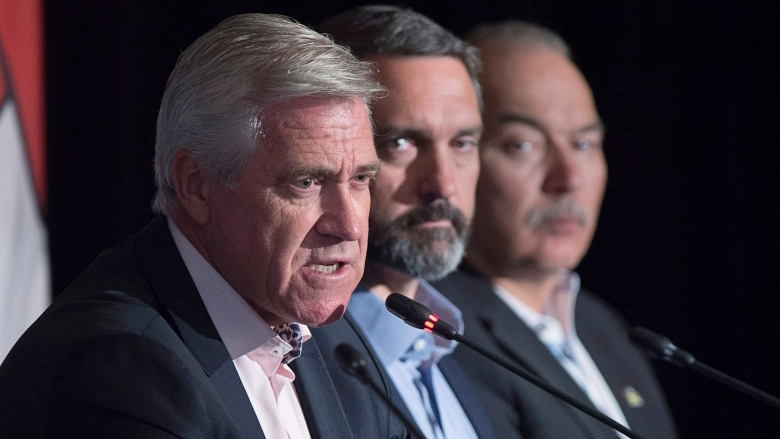Premiers call for ‘voluntary’ pharmacare program funded by Ottawa
Quebec confirms it will opt out of federal drug plan,

Newfoundland and Labrador Premier Dwight Ball, left, made it clear at the premiers’ closing news conference Friday that if the federal government wants a national drug program, it must be prepared to pay for it. Andrew Vaughan, Canadian Press
Janyce McGregor, CBC News July 20, 2018
The final communiqué from this week’s Council of the Federation talks makes a few things clear about how provinces and territories feel about pharmacare: They don’t all intend to participate in a federal drug plan, and those that do aren’t interested in sharing the cost.
Premiers focused on health-care issues on Friday, the second day of their annual summer gathering in Saint Andrews, N.B.
Host premier Brian Gallant said premiers didn’t get into the “nitty gritty” of the possible costs of a national drug benefit, but “many around the table spoke passionately about how they would expect the federal government to be a part of it financially, if not cover all of it,” he said.
The provinces and territories continue to unanimously call on the federal government to restore health-care funding to sustainable levels. Premier Dwight Ball said that in Newfoundland and Labrador, his province now funds 83 per cent of health-care costs, whereas in 1984 the federal-provincial cost sharing was about 50-50.
Now that the federal government has signalled its interest in proceeding with the development of a national pharmacare plan and appointed a former Ontario health minister, Eric Hoskins, to lead a team developing potential models for implementing it, provinces are keen to frame the conversation in monetary terms once again.
“What we’re looking for there is a federally funded, federally sustainable program,” Ball said. “There’s a lot of room for the federal government to be more involved in health care.”
| Provinces set their terms |
The premiers’ “very robust” discussion, to use Ball’s words, set out principles for the kind of federal program that would be acceptable to provinces and territories:
- the focus should be on improving access by removing cost barriers.
- pharmacare should be designed based on the best available evidence about potential benefits, risks, costs and reliability of supply.
- provinces and territories must retain responsibility for designing and delivering public drug coverage.
- the federal funding must be “long-term, adequate, secure, flexible and take into account present and future cost pressures.”
In addition, premiers are insisting on the right for any province or territory to opt out unconditionally, with full financial compensation.
Quebec has already indicated that it will, sticking with its existing drug benefit plan.
Hoskins is spending his summer consulting with provincial and territorial officials, hearing feedback like this about what kind of federal program would be acceptable.
His challenge is to take it all in and figure out a model that will work — a model, it appears, that may have been initiated by the federal government but won’t be delivered on a standard, national basis, if provinces and territories keep insisting on the flexibility to each deliver it their own way.
| Not if, but how |
Eight premiers began the day Friday at a roundtable breakfast organized by the Federation of Nurses Unions, a public health-care advocacy group that’s been organizing lobbying efforts at the summer premiers meeting for years.
Hoskins was the featured speaker, updating officials from every province and territory on his early consultations.

Eric Hoskins, left, heads the federal advisory council on implementing a national pharmacare program. He spoke Thursday at a breakfast meeting organized on the margins of the Council of the Federation talks in Saint Andrews, N.B. Linda Silas, the president of the Canadian Federation of Nurses Unions, right, said eight premiers attended the event. Andrew Vaughan, Canadian Press
Kevin Page, the former parliamentary budget officer, also spoke at the breakfast about recent research on potential costs for a universal drug program, as did MP John Oliver, who sat on the House of Commons health committee that studied Canada’s pharmacare options and reported back to Parliament last spring.
The premiers of Ontario, Saskatchewan, Quebec and the Northwest Territories were among those who did not attend, according to event organizer Linda Silas. But officials from every province and territory were there, she said, as well as 82 health-care stakeholders who have travelled to New Brunswick to meet on the margins of the premiers’ talks.
“It’s less a question of if and more a question of how,” Hoskins told reporters after the breakfast. His work is not another study on pharmacare, he said, but a blueprint for how it can come to pass.
According to Hoskins, Canada has more than 100 public drug plans and over 500 private drug plans that cover different people in different jurisdictions, according to different criteria.
This “tremendous diversity,” he said, comes at the expense of consistency: some people can access medicine others cannot, and what’s covered is changing every day.
Page’s research included a ballpark $20 billion figure as a potential annual cost for federal pharmacare.
Other research suggests Canada’s governments, including provinces and territories, currently spend up to $34 billion on drug costs, Hoskins said. He’s confident governments can save money by co-operating more on pharmacare.
The model Hoskins hopes to propose will need “a certain degree of flexibility,” he said.
![]() Source CBC News
Source CBC News
Also see
What should universal pharmacare look like? Advisory council turns to B.C. citizens for answers CBC News British Columbia
B.C. hopes for action on national pharmacare plan CBC News British Columbia
Taxes will rise if Canadians want national pharmacare, says former budget watchdog CBC News
Pharmacare won’t be free for all Canadians, Bill Morneau says CBC News
Ontario’s new pharmacare plan a tough pill to swallow, say critics CBC News Toronto
